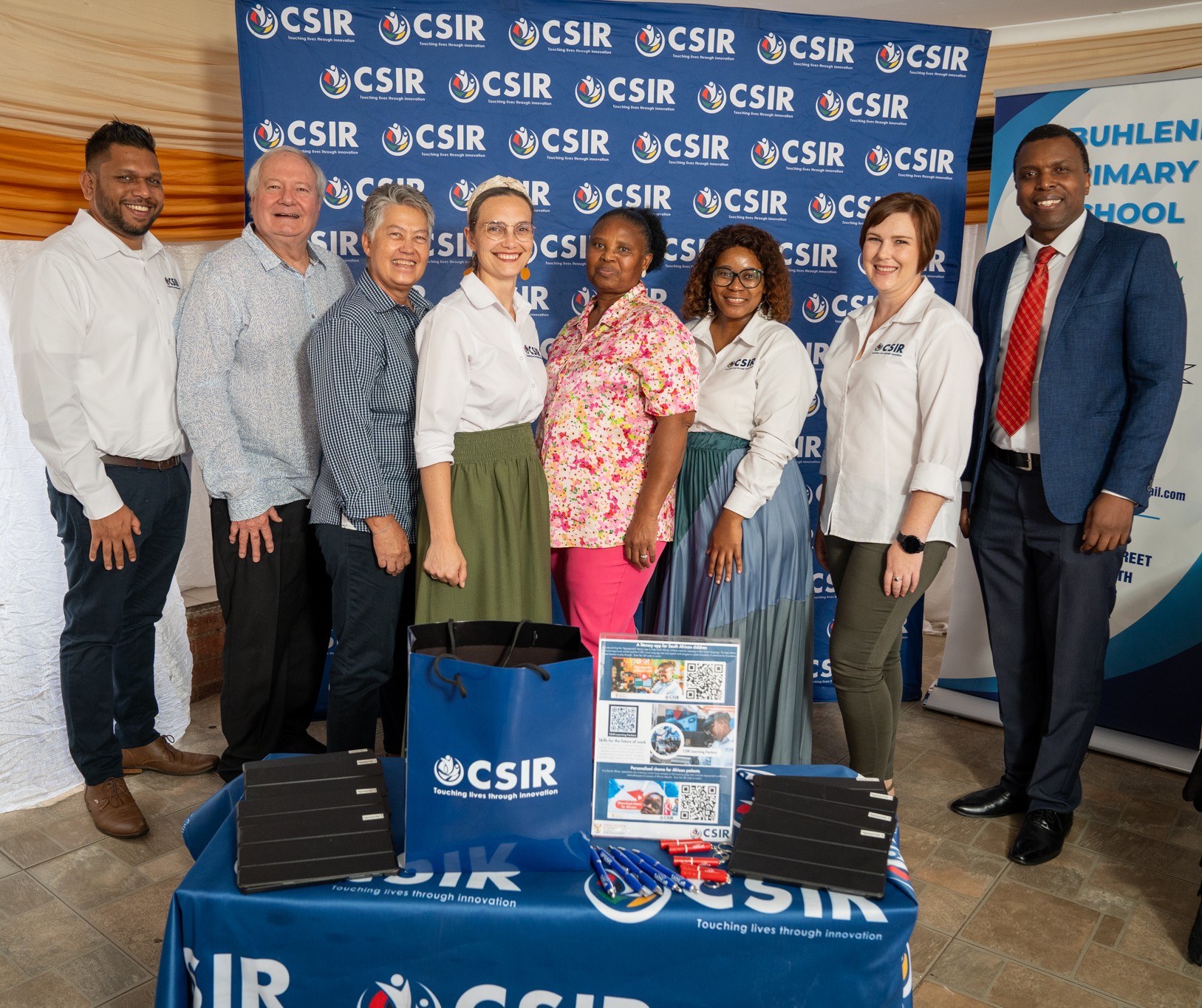CSIR celebrates the completion of phase one of Ngiyaqonda!
On Wednesday 12 March, the Council for Scientific and Industrial Research (CSIR) marked the successful completion of phase one of the Ngiyaqonda! project with the handover of mobile devices to the first pilot school. Ebuhleni Primary School received the devices during a handover event hosted at the school.
There is an increasing awareness of the literacy crisis in South African schools, most notably highlighted by a report from the 2030 Reading Panel, which revealed that approximately 80% of Grade 3 learners in South Africa cannot read for meaning in any language.
On Wednesday 12 March, the Council for Scientific and Industrial Research (CSIR) marked the successful completion of phase one of the Ngiyaqonda! project with the handover of mobile devices to the first pilot school. Ebuhleni Primary School received the devices during a handover event hosted at the school.
There is an increasing awareness of the literacy crisis in South African schools, most notably highlighted by a report from the 2030 Reading Panel, which revealed that approximately 80% of Grade 3 learners in South Africa cannot read for meaning in any language. Without this essential skill, many children are unable to reach their full potential, with the impact being most severe in disadvantaged communities.
To help address this crisis, the CSIR launched the Ngiyaqonda! isiZulu for *(“I understand”), Project, a research and development initiative aimed at improving home-language literacy. The project integrates speech and text technology for South African languages into an Android application designed to enhance reading skills. Funded by the Department of Sport, Arts and Culture, the project also incorporates artefacts developed in previous research projects funded by the South African Centre for Digital Language Resources.
The application was piloted with isiZulu-speaking grade three learners at Ebuhleni Primary School in Soweto, Sepedi-speaking grade three learners at Pheladi-Nakene Primary School in Mamelodi and Afrikaans-speaking learners at Laerskool Die Krans, throughout 2023 and 2024. In recognition of the pilots’ success and the positive social impact of Ngiyaqonda!, the CSIR donated the devices used at Ebuhleni Primary School during a project close-out event on Thursday, 13 March 2025.
Piloting in schools is a vital component of projects like Ngiyaqonda! as it enables the project team to assess their efforts in real-world settings. However, South Africa's infrastructure challenges, such as connectivity and electricity issues, make it essential to cultivate strong relationships with pilot schools. These partnerships provide a crucial foundation for identifying and addressing any challenges that may affect application usage. When CSIR donates tablets to schools like Ebuhleni and Pheladi-Nakene, the CSIR is not only supporting future pilots but also helping to overcome some of these infrastructure challenges, ensuring smoother implementation in the future.
“By donating these devices to our pilot schools, we hope to strengthen our relationships with them and demonstrate our commitment to continuing work on this critical issue. Without their willingness to invest time and energy, as well as share essential practical insights with us, no amount of technological development would move the needle on South Africa’s literacy challenges," said CSIR senior researcher Laurette Marais.
The success of the project underscores the crucial role of collaboration between government, research institutions and end-users in maximising the social impact of technology. By harnessing technology, these partnerships can effectively address key challenges in South Africa, such as literacy. The CSIR develops a range of innovative speech, text and generative artificial intelligence solutions designed to significantly enhance efforts in tackling educational challenges across the country. To further its work in addressing literacy challenges, the CSIR has applied for additional funding to advance to phase two of the Ngiyaqonda! project. The team is also actively seeking private sector partnerships to expand the initiative’s reach and impact.

-ENDS-
Issued by CSIR Strategic Communication
Media enquiries :
contact: Phetolo Phatsibi, CSIR Media Relations Practitioner
Email: PPhatsibi@csir.co.za
Mobile: 0813968871
More news in the media:
- CSIR wraps up literacy pilot, donates devises - article by itweb
About the CSIR:
The CSIR, an entity of the Department of Science, Technology and Innovation, is one of Africa’s leading organisations in scientific and technology research, development and implementation. Constituted by an Act of Parliament in 1945 as a science council, the CSIR undertakes directed and multidisciplinary research and technological innovation, as well as industrial and scientific development, to improve the quality of life of all South Africans.
This year, the CSIR celebrates 80 years of touching lives through innovation. For more information, visit www.csir.co.za
Follow us on social media:
X: @CSIR. Facebook: CSIRSouthAfrica. Instagram: CSIRSouthAfrica. LinkedIn: Council for Scientific and Industrial Research (CSIR). YouTube: CSIRNewMedia

